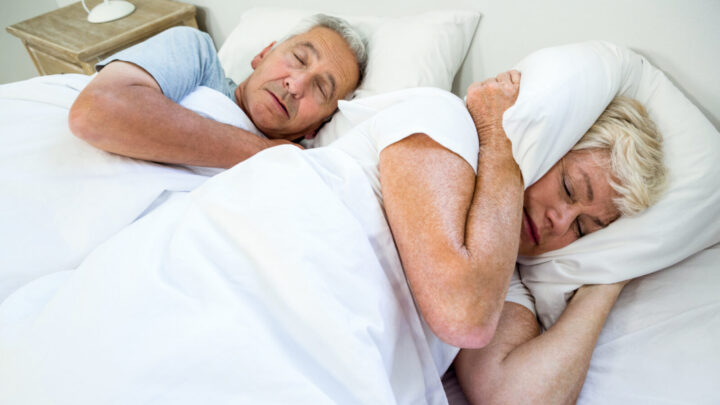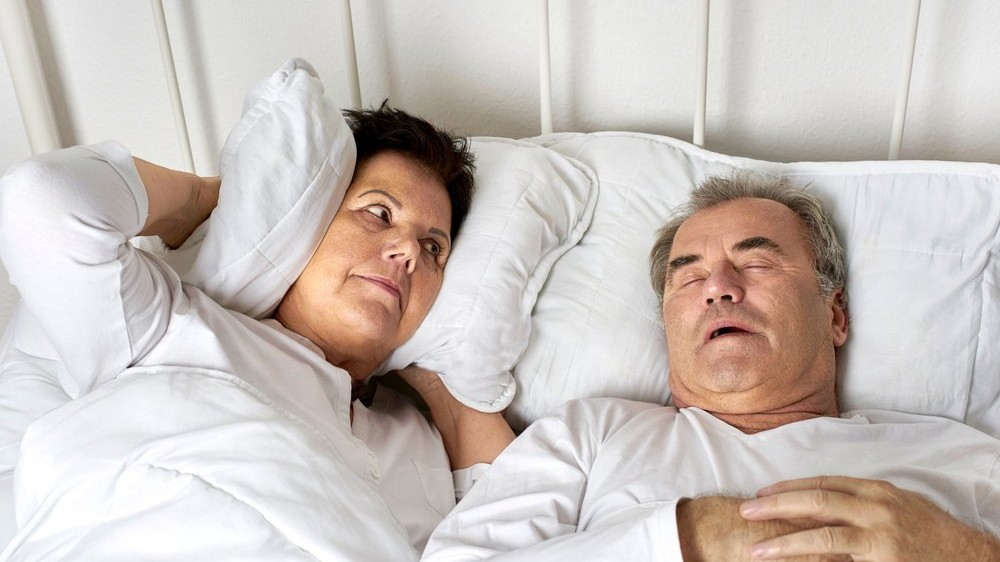Are you a snorer? Find out the MYTHS and FACTS about the causes and cures of snoring
- Replies 1
Is your snoring something that your significant other or other members of your family frequently comment on? Have you ever questioned whether your snoring could be an indication of a more serious condition, such as sleep apnoea, which could be fatal?
Some of you members might not be aware, but snoring is a serious health issue that can be both obtrusive and potentially fatal.
There are countless strange and wonderful remedies for this bothersome condition, but there is a lot of misinformation out there about what can make your snoring worse or lessen it.
In this article, we will try and help dispel some of the confusion surrounding the topic of snoring by debunking four common myths and uncovering four facts that may come as a surprise to you.

Credit: Getty.
First, let's talk about some myths about snoring that are widely believed:
Snoring will be alleviated by drinking a nightcap. (FALSE)
According to popular belief, a nightcap can make it easier for you to fall asleep.
While that may be true for some people, there is no proof, however, that drinking alcohol before bed will reduce snoring. There is a good chance that it will actually have the exact opposite effect.
Drinking alcohol four to five hours before going to bed can make things worse because it relaxes muscles, which lowers the tone of the muscles at the back of the throat while we are sleeping.
Everyone can be affected by this, and after a night of heavy drinking, even those who don't typically snore may start to do so.
Snoring can be reduced with sleeping pills. (FALSE)
While it's true that sleeping pills can make it easier for you to fall asleep, they won't stop you from snoring.
Similar to alcohol, these sleep aids tend to relax the body, which can weaken the muscles in the back of the throat and result in snoring.
Along with increasing your likelihood of snoring, these medications are also speculated to worsen the sleep apnoea that causes snoring and make it more frequent.
The more episodes of sleep apnoea you have, the more you'll snore. This means that sleeping pills can put you on a slippery slope.
The best way to stop snoring is to sleep on your back. (FALSE)
Although sleeping on your back has some health benefits, it is unlikely to help you stop snoring.
It is believed that sleeping on your back is beneficial for your spine, but it also increases the likelihood that your tongue will fall back into your mouth, obstructing your airways and causing sleep apnoea.
A study found that switching from sleeping on one's back to sleeping on one's side improved nighttime breathing and reduced snoring.
Surgery is the only treatment option available for sleep apnoea. (FALSE)
In some patients, a successful treatment for sleep apnoea may require medical professionals to perform surgery. However, this is only applicable in certain circumstances, such as a child whose large tonsils are obstructing their airways, so it is not a general rule.
Although some adults may decide to have tissue in their noses, mouths, or throats surgically removed or tightened, it may not be necessary for everyone.
Because sleep apnoea and snoring can also be brought on by poor hygiene, a posture problem, or gravity, a doctor is also likely to recommend a series of lifestyle changes before suggesting surgery.

Credit: SnoreLab.
Now that we've cleared up some of the most widespread myths and misconceptions, let's move on to the facts:
Hormone replacement therapy, or HRT, can lessen snoring. (TRUE)
Women can experience snoring just like men can, and after menopause, some women may experience worse symptoms.
Scientists at Norway's University of Bergen have found that sleep apnoea is more common in women who have gone through menopause because their levels of the hormones oestrogen and progesterone are lower.
When women receive HRT, these hormones are replaced, which has led to hopes that it might help with sleep apnoea and snoring.
According to the study, when the hormone levels were restored to pre-menopausal levels, the snoring and other sleep apnoea symptoms subsided.
Snoring can be effectively treated with tongue exercises. (TRUE)
In a study that was conducted in 2013, researchers revealed that a simple routine of tongue exercises can significantly cut down on the amount of snoring that patients experience.
The research, which was published in the journal CHEST, found that in people with primary snoring or mild OSA, oropharyngeal, or mouth and tongue exercises cut the number of times they snored by 36% and the amount of noise they made by 59%.
These drills involve sliding the tongue backwards 20 times and pressing the tongue's tip against the hard palate.
Another quick exercise suggests pressing the tongue's back 20 times against the mouth's floor while maintaining the tongue's tip in contact with the lower incisor.
Singing can help cut down on snoring. (TRUE)
According to a study done by the Royal Devon and Exeter Hospital, singing can help lower the likelihood of snoring. This is because a lack of tone in the throat muscles is believed to be a major cause of the condition.
When singing, the same muscles that are in the upper throat and soft palate are strengthened, reducing the chance of snoring.
Snoring is made worse when you have hay fever. (TRUE)
The allergic response to pollen that results in hay fever can make people sneeze frequently and have itchy ears, mouth, nose, and throat. It is for this reason that hay fever tends to make people's snoring more severe.
Allergy sufferers frequently have runny or blocked noses and may have to switch to mouth breathing while sleeping.
Mouth breathing while sleeping can make your tongue fall further back, cause throat compressions from a lowered jaw, and result in a dry mouth and throat.
What are your thoughts, folks? Have you known some of these facts and myths for a time now, or are they new to you?
To learn more information about sleep apnoea, check out this video below:
Credit: Osmosis.
Some of you members might not be aware, but snoring is a serious health issue that can be both obtrusive and potentially fatal.
There are countless strange and wonderful remedies for this bothersome condition, but there is a lot of misinformation out there about what can make your snoring worse or lessen it.
In this article, we will try and help dispel some of the confusion surrounding the topic of snoring by debunking four common myths and uncovering four facts that may come as a surprise to you.
Credit: Getty.
First, let's talk about some myths about snoring that are widely believed:
Snoring will be alleviated by drinking a nightcap. (FALSE)
According to popular belief, a nightcap can make it easier for you to fall asleep.
While that may be true for some people, there is no proof, however, that drinking alcohol before bed will reduce snoring. There is a good chance that it will actually have the exact opposite effect.
Drinking alcohol four to five hours before going to bed can make things worse because it relaxes muscles, which lowers the tone of the muscles at the back of the throat while we are sleeping.
Everyone can be affected by this, and after a night of heavy drinking, even those who don't typically snore may start to do so.
Snoring can be reduced with sleeping pills. (FALSE)
While it's true that sleeping pills can make it easier for you to fall asleep, they won't stop you from snoring.
Similar to alcohol, these sleep aids tend to relax the body, which can weaken the muscles in the back of the throat and result in snoring.
Along with increasing your likelihood of snoring, these medications are also speculated to worsen the sleep apnoea that causes snoring and make it more frequent.
The more episodes of sleep apnoea you have, the more you'll snore. This means that sleeping pills can put you on a slippery slope.
The best way to stop snoring is to sleep on your back. (FALSE)
Although sleeping on your back has some health benefits, it is unlikely to help you stop snoring.
It is believed that sleeping on your back is beneficial for your spine, but it also increases the likelihood that your tongue will fall back into your mouth, obstructing your airways and causing sleep apnoea.
A study found that switching from sleeping on one's back to sleeping on one's side improved nighttime breathing and reduced snoring.
Surgery is the only treatment option available for sleep apnoea. (FALSE)
In some patients, a successful treatment for sleep apnoea may require medical professionals to perform surgery. However, this is only applicable in certain circumstances, such as a child whose large tonsils are obstructing their airways, so it is not a general rule.
Although some adults may decide to have tissue in their noses, mouths, or throats surgically removed or tightened, it may not be necessary for everyone.
Because sleep apnoea and snoring can also be brought on by poor hygiene, a posture problem, or gravity, a doctor is also likely to recommend a series of lifestyle changes before suggesting surgery.
Credit: SnoreLab.
Now that we've cleared up some of the most widespread myths and misconceptions, let's move on to the facts:
Hormone replacement therapy, or HRT, can lessen snoring. (TRUE)
Women can experience snoring just like men can, and after menopause, some women may experience worse symptoms.
Scientists at Norway's University of Bergen have found that sleep apnoea is more common in women who have gone through menopause because their levels of the hormones oestrogen and progesterone are lower.
When women receive HRT, these hormones are replaced, which has led to hopes that it might help with sleep apnoea and snoring.
According to the study, when the hormone levels were restored to pre-menopausal levels, the snoring and other sleep apnoea symptoms subsided.
Snoring can be effectively treated with tongue exercises. (TRUE)
In a study that was conducted in 2013, researchers revealed that a simple routine of tongue exercises can significantly cut down on the amount of snoring that patients experience.
The research, which was published in the journal CHEST, found that in people with primary snoring or mild OSA, oropharyngeal, or mouth and tongue exercises cut the number of times they snored by 36% and the amount of noise they made by 59%.
These drills involve sliding the tongue backwards 20 times and pressing the tongue's tip against the hard palate.
Another quick exercise suggests pressing the tongue's back 20 times against the mouth's floor while maintaining the tongue's tip in contact with the lower incisor.
Singing can help cut down on snoring. (TRUE)
According to a study done by the Royal Devon and Exeter Hospital, singing can help lower the likelihood of snoring. This is because a lack of tone in the throat muscles is believed to be a major cause of the condition.
When singing, the same muscles that are in the upper throat and soft palate are strengthened, reducing the chance of snoring.
Snoring is made worse when you have hay fever. (TRUE)
The allergic response to pollen that results in hay fever can make people sneeze frequently and have itchy ears, mouth, nose, and throat. It is for this reason that hay fever tends to make people's snoring more severe.
Allergy sufferers frequently have runny or blocked noses and may have to switch to mouth breathing while sleeping.
Mouth breathing while sleeping can make your tongue fall further back, cause throat compressions from a lowered jaw, and result in a dry mouth and throat.
What are your thoughts, folks? Have you known some of these facts and myths for a time now, or are they new to you?
To learn more information about sleep apnoea, check out this video below:
Credit: Osmosis.







